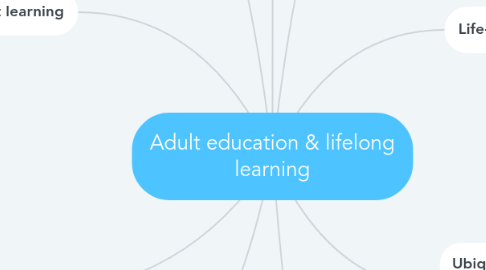Adult education & lifelong learning
by Katrin Aedma

1. Adult education
1.1. Systematic activities to gain knowledge or skills
2. Recurrent education
2.1. Education for people who are in the world of work or in a period of unemployment, who have leisure time or are retired, and who return at intervals to organized learning
3. Adult learning
3.1. The entire range of formal, non-formal and informal learning activities which are undertaken by adults after a break since leaving initial education and training, and which results in the acquisition of new knowledge and skills
3.1.1. Formal learning,: training typically provided by an education or training institution, structured (in terms of learning objectives, learning time or learning support) and leading to certification. Formal learning is intentional from the learner’s perspective.
3.1.2. Non-formal learning - Education and training which takes place outside the formal system either on a regular or intermittent basis.
3.1.3. Informal learning - resulting from daily life activities related to work, family or leisure. Informal learning is part of non-formal learning. It is often referred to as experience based learning and can to a certain degree be understood as accidental learning
4. Continuing education
4.1. education for adults in a variety of subjects, most of which are practical, not academic. =university extension = extension school - post-secondary learning activities and programs
5. Lifewide learning
5.1. involves a breadth of experiences, guides, and locations and includes core issues such as adversity, comfort, and support in our lives.
6. Life-deep learning
6.1. Embraces religious, moral, ethical, and social values that guide what people believe, how they act, and how they judge themselves and others. Fundamental in such learning is language
7. Lifelong learning
7.1. Voluntary, and self-motivated learning what takes place on an ongoing basis from our daily interactions with others and with the world around us. The process of gaining knowledge and skills throughout your life, often to help you do your job properly. It refers to the acquisition of fundamental behaviors (e.g., walking and recognizing faces) and real-world information (e.g., objects fall when dropped, steeper inclines require more exertion than gradual ones). Learning that extends from our childhood into old age includes all the ways we manage interpersonal sociability, reflect our belief systems, and orient to new experiences
8. Ubiquitous learning
8.1. defined as an all day learning environment supported by technology
9. Used matherial: https://dictionary.cambridge.org/spellcheck/english/?q=life-deep%2Blearning Learning in and out of school in diverse environments: Life-long, life-wide, life-deep. LIFE Center, University of Washington, Stanford University, and SRI International, 2007. Retrieved from: http://www.life-slc.org/docs/Banks_etal-LIFE-Diversity-Report.pdf Final report for: Study on European Terminology in Adult Learning for a common language and common understanding and monitoring of the sector (July, 2010), p. 6 Retrieved from http://www3.hants.gov.uk/adult-learning-definition.pdf UNESCO-UNEVOC Definition of Formal, Informal, and Nonformal learning Retrieved from: https://unevoc.unesco.org/print.php?q=Definition+of+Formal,+Informal,+and+Nonformal+learning https://www.collinsdictionary.com/dictionary/english/continuing-education


